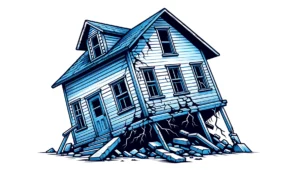Are you noticing cracks in your walls, uneven floors, or doors that just won’t close properly? These could be telltale signs of foundation issues lurking beneath your home. In our comprehensive guide, we will delve into the signs of foundation issues and equip you with the knowledge to determine if your home is at risk. From identifying common indicators like cracks and water damage to understanding the steps for a thorough inspection, we’ve got you covered. Whether you’re a seasoned homeowner or a first-time buyer, knowing how to spot foundation issues early can save you time, money, and stress down the line. So, grab a cup of coffee, settle in, and let’s explore the world beneath your feet together.
Common Signs of Foundation Issues
In this article, we’ll cover:
ToggleAre you noticing cracks in your walls, uneven floors, or doors that just won’t close properly? These could be telltale signs of foundation issues lurking beneath your home. Let’s dive deeper into the common signs you should be aware of:
Cracks in Walls
- Types of cracks to look for: Vertical, horizontal, stair-step, or diagonal cracks can indicate different issues.
- Location of cracks in relation to the foundation: Understanding where the cracks are can help pinpoint the source of the problem.
- When to be concerned: Not all cracks are serious, but some may require immediate attention.
- Possible causes of cracks: Soil settlement, poor construction, or water damage can lead to wall cracks.
Uneven Floors
- How to check for uneven floors: Place a marble on the floor or use a level to detect any sloping or unevenness.
- Causes of uneven floors: Poor soil compaction, foundation settlement, or water intrusion can result in uneven floors.
- Impact on foundation stability: Uneven floors can indicate structural issues that may compromise the integrity of your foundation.
- Repair options: Depending on the severity, solutions may range from simple adjustments to extensive foundation repairs.
Stay tuned for more insights on how to determine if your home is at risk and what preventative measures you can take to maintain a healthy foundation.
Steps to Determine if Your Home is at Risk
As a homeowner, it’s crucial to understand how to assess the potential risk of foundation issues in your home. Let’s walk through the steps you can take to make an informed decision:
Visual Inspection
- Exterior checks: Look for cracks in the foundation, gaps around doors/windows, or sloping in the yard.
- Interior checks: Inspect for cracks in walls, uneven floors, or doors/windows that stick.
- Using tools for assessment: Utilize a level, tape measure, or flashlight to aid in your inspection.
- Documenting findings: Take photos and notes to track changes over time and share with a professional inspector.
Professional Inspection
- Finding a reputable inspector: Research local inspectors with experience in foundation assessments.
- What to expect during inspection: Prepare for a thorough evaluation of your home’s foundation and structural integrity.
- Interpreting the report: Understand the findings and recommendations provided by the inspector
- Getting repair estimates: Obtain quotes from multiple contractors to compare pricing and services.
- If you’re in the Dallas, Irving, or surrounding areas, feel free to reach out to us over at Portman Foundation Repair to get a completely free foundation repair evaluation and tailored professional advice.
By following these steps, you can proactively address any potential foundation issues and ensure the stability and safety of your home. Stay informed and take action to protect your investment.

Preventative Measures for Foundation Health
Ensuring the longevity and stability of your home’s foundation requires proactive maintenance and preventative measures. Let’s explore the steps you can take to safeguard your foundation:
Proper Drainage
- Importance of good drainage: Prevents water from pooling around the foundation and causing damage.
- Gutters and downspouts maintenance: Regularly clean gutters and ensure downspouts direct water away from the foundation.
- Grading around the foundation: Ensure the soil slopes away from the house to prevent water accumulation.
- Installing French drains: Redirect excess water away from the foundation to prevent saturation.
Moisture Control
- Sources of excess moisture: Identify and address sources like leaks, poor ventilation, or high humidity levels.
- Using dehumidifiers: Maintain optimal indoor humidity levels to prevent moisture-related issues.
- Waterproofing basements/crawl spaces: Seal vulnerable areas to prevent water intrusion.
- Ventilating the foundation: Ensure proper airflow to prevent moisture buildup.
- Utilize proper drainage systems: Redirect water away from the foundation to prevent flooding.
Landscaping Considerations
- Tree placement near the foundation: Plant trees at a safe distance to prevent root intrusion.
- Soil composition and watering: Use appropriate soil types and watering techniques to maintain soil stability.
- Impact of roots on the foundation: Monitor tree roots and address any potential risks to the foundation.
- Creating a barrier: Install root barriers to prevent roots from growing towards the foundation. Root barriers are typically made from plastic or metal and should be buried at least 18–24 inches deep.
Regular Inspections and Maintenance
- Scheduling annual inspections: Stay proactive in monitoring your foundation’s health.
- DIY maintenance tasks: Address minor issues promptly to prevent escalation.
- Signs to watch for: Be vigilant for any changes in your home’s structure or foundation.
- Addressing issues promptly: Take immediate action to prevent small problems from becoming major repairs. Ignoring warning signs can lead to costly and extensive damage.
By implementing these preventative measures, you can protect your home’s foundation and ensure a stable living environment for years to come. Stay informed, stay proactive, and safeguard your investment.
Keep Your Home’s Foundation Safe
In conclusion, being aware of the signs of foundation issues and taking proactive steps to protect your home is essential for every homeowner. By recognizing common indicators, conducting thorough inspections, and implementing preventative measures, you can safeguard your investment and ensure the longevity of your foundation. Remember, early detection and timely action are key to avoiding costly repairs down the line. Stay vigilant, stay informed, and prioritize the health of your home’s foundation. If you have any concerns or need professional assistance, don’t hesitate to give us a call at (469) 957-7343. Your home’s stability is worth the effort.



